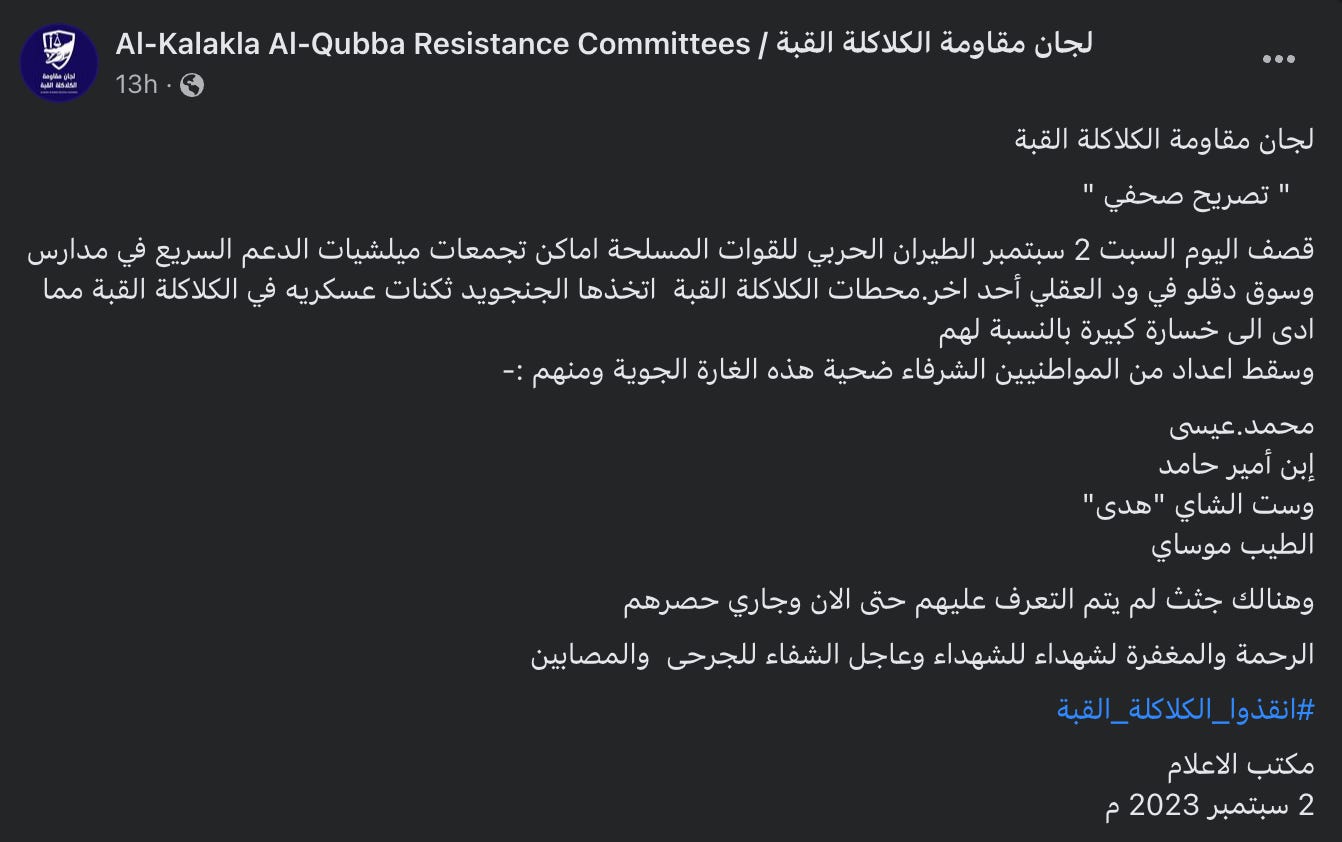Airstrike kills 20 civilians at Khartoum market
Women, children, and merchants among the dead
Update, September 12: The death toll in this article, originally reported to be 20, rose to 21, according to a report by Doctors Without Borders: “on September 2, following another strike on a market in south Khartoum, the MSF-supported Turkish Hospital received 21 dead and 6 severely injured people who were treated in the emergency room.”
An airstrike in the Kalakla al-Qubba (Wad al-Agali) neighborhood of southwest Khartoum yesterday killed 20 civilians, including at least one tea lady, two children, and an old man.
Gruesome video of the scene as well as reports from local activists and hospital volunteers confirm the attack. Early casualty reports yesterday varied because some victims were buried in rubble, and others were mortally wounded but had not yet died.
However, by midnight last night the toll rose to “20 civilians killed,” according to the Kalakla and South Khartoum Emergency Room, an initiative of hospital volunteers.
The group initially reported the death toll to be 11 civilians, including two children and a woman, before releasing updates saying the toll had risen to 16 and then 20.
A video of the site shows nine bodies, all of whom are civilians. There is a large amount of rubble from a collapsed wall, which could have buried additional victims not seen in the video. Plastic chairs and other objects typically used by tea ladies hint at the civilian nature of the site.


There were two carts too, including one pulled by a donkey, which was killed.
Early reports of the bombing yesterday, including one by the media office of the Al-Kalakla al-Qubba Resistance Committees, suggested that the target of the air raid was a so-called “Dagalo Market,” a new slang term for impromptu markets where looted and black market goods are sold in territories controlled by the Rapid support Forces.
If true, there could have been casualties among the RSF too, since these markets are sometimes attended by the militia members, who participate in the trade in stolen goods. The Al-Kalakla al-Qubba Resistance Committees mentioned losses among the RSF in one of their social media posts about the incident. The statement also suggests there was more than one impact site, specifically at a school. However, there was no other report of this or visual evidence, as far as we are aware.
Video of the bomb site
Gory parts of the video have been pixellated, but it is still disturbing to watch.
The member of the Rapid Support Forces speaking in the video emphasizes how poor the victims are, including tea ladies. Note, although the video was circulated by RSF accounts, the geolocation provides independent confirmation of the imagery, and the casualty figures come from third-party sources not affiliated with the RSF.
The victims in the video in the order in which they appear are:
A donkey (apparently dead) (0:02)
A man or teenage boy lying in the open (apparently dead) (0:10)
A man who appeared to have been pushing a cart (dead) (0:45)
Two men largely covered in rubble (apparently dead) (0:55-1:10)
Very severely wounded man and woman, not receiving any medical attention (1:20) (possibly among those reported dead later)
A woman identified as a “tea lady” (dead) (1:33)
Another body of unidentified gender under the rubble (dead) (1:36)
A boy or man found under a cloth used as a roof for a makeshift shop (dead) (1:58)
Geolocation of the Video
Geolocation of the site was somewhat difficult, but clues from the third-party reports led to a likely location: 📍15.4431883, 32.4682369 (اخر محطة ود العقلي).
This area is called Wad al-Agali and it is on the southern end of Kalakla al-Qubba, less than 1 km from the bank of the White Nile in southwest Khartoum.



Identification of victims
At least five of the victims are known so far by name. The Kalakla al-Qubba Resistance Committee identified the following four:
Mohammed Issa
Ibin Amir Hamed
Tea lady “Huda”
Altayeb Musawi
Additionally, a relative of one of the victims writing on Facebook confirmed the identity of another victim, Ahmed Idris Mohamed Kanin.
Sudan War Monitor is an independent open source monitoring initiative that began after the outbreak of conflict in April 2023. We are not affiliated with any party in the war.








